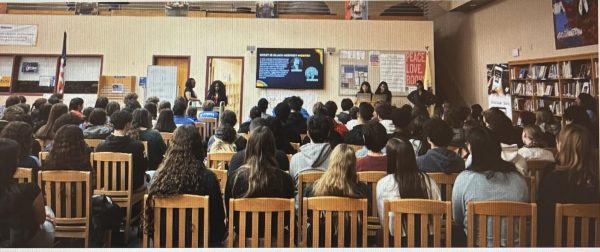Students and Staff Write for Justice

Sophomores Rachel Bach and Sophie Dorman wrote letters for the Write for Rights campaign. (Photo by Aaliyah Khan)
By Aaliyah Khan
Staff Reporter
The Warren Hills Human Rights Club and Gay Straight Alliance held Amnesty International’s annual Write for Rights campaign after school in the library for Human Rights Day, in early December.
Amnesty International, an international organization that fights for the human rights of all, has helped free 153 wrongfully imprisoned individuals, alone last year. The organization’s Write for Rights campaign is just one event that helps to release the innocent, one letter at a time. The annual Write for Rights campaign marks the start of Human Rights Day on December 10, with thousands of people writing letters around the world to government officials, concerning the release of people imprisoned for defending human rights around the world.
According to the Amnesty International website,
“Sometimes a letter can change someone’s life. That’s the premise of Write for Rights, Amnesty’s global letter-writing campaign.
“Every year, we ask supporters to write two letters. One is to the person in authority – it could be a king, president or head of police – who can help make change happen,” the statement on the Amnesty International website read. “And the other letter is to the person (or group of people) we are fighting for, so they know we will never forget them.”
This year’s campaign featured ten cases of injustice around the world, asking for the end of convictions, discrimination, charges, and harassment, and seeking protection, recognition, investigations and freedom for the innocents involved in these cases.
Letters not only help convince governments to release and protect people, but also provide hope to those convicted and constantly remind people of human rights violations around the world.
The Warren Hills’ Human Rights Club has been participating in Write for Rights campaign for three years. This year, about 30 people participated in the annual writing campaign.
For Human Rights Club advisor Deborah Rokosny, the Write for Rights campaign is a powerful tool for effecting change.
“Change happens because of those letters by putting pressure on government officials to take action. People wrongly imprisoned are released and torturers are brought to justice,” she said. “It is empowering to think that a single action, writing a letter, can make a difference in someone’s life.”




